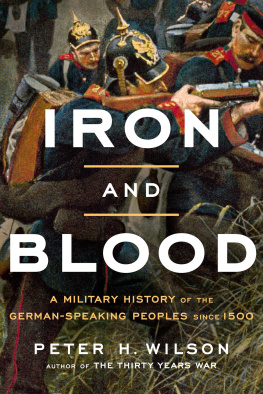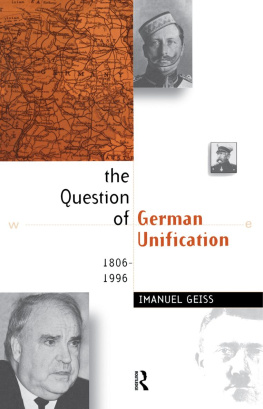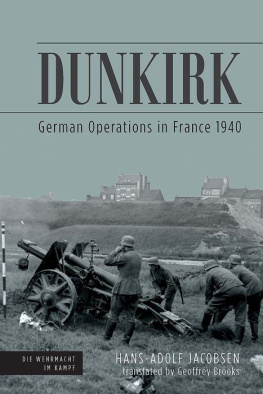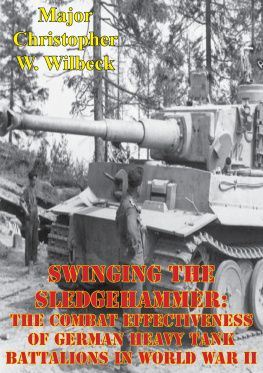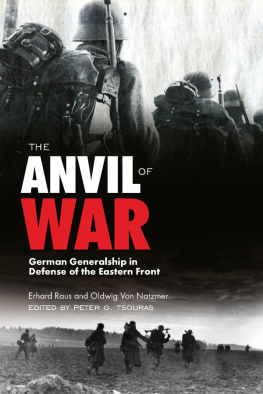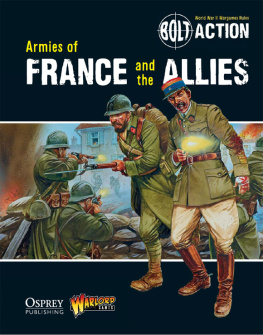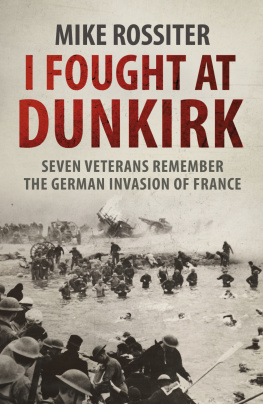Derek Pennington - The German Peace
Here you can read online Derek Pennington - The German Peace full text of the book (entire story) in english for free. Download pdf and epub, get meaning, cover and reviews about this ebook. year: 2017, publisher: Independently Published, genre: Science fiction / Prose. Description of the work, (preface) as well as reviews are available. Best literature library LitArk.com created for fans of good reading and offers a wide selection of genres:
Romance novel
Science fiction
Adventure
Detective
Science
History
Home and family
Prose
Art
Politics
Computer
Non-fiction
Religion
Business
Children
Humor
Choose a favorite category and find really read worthwhile books. Enjoy immersion in the world of imagination, feel the emotions of the characters or learn something new for yourself, make an fascinating discovery.
- Book:The German Peace
- Author:
- Publisher:Independently Published
- Genre:
- Year:2017
- ISBN:978-1-521-11467-4
- Rating:4 / 5
- Favourites:Add to favourites
- Your mark:
- 80
- 1
- 2
- 3
- 4
- 5
The German Peace: summary, description and annotation
We offer to read an annotation, description, summary or preface (depends on what the author of the book "The German Peace" wrote himself). If you haven't found the necessary information about the book — write in the comments, we will try to find it.
The German Peace — read online for free the complete book (whole text) full work
Below is the text of the book, divided by pages. System saving the place of the last page read, allows you to conveniently read the book "The German Peace" online for free, without having to search again every time where you left off. Put a bookmark, and you can go to the page where you finished reading at any time.
Font size:
Interval:
Bookmark:
Derek Pennington
THE GERMAN PEACE
This book is dedicated to my beautiful daughter Kathy, the best daughter in the world,
and
my lovely wife Natalia, the best wife in the world

PREFACE
The Second World War never happened!
The allied army trapped at Dunkirk in Northern France was resoundingly defeated by the German forces in May 1940 after its planned evacuation proved to be a costly failure.The German Army continued its sweep into France and by mid-June Paris was occupied and an armistice agreed by the French.
A vast swathe of Europe was now under German rule. In the west, only Britain stood alone against a triumphant Germany. A Britain that had lost the bulk of its army and equipment at Dunkirk. Invasion is inevitable.
A worried British Prime Minister, Winston Churchill, said, It is my considered opinion that it is highly unlikely Britain could resist a German invasion as things stand right now.
But an event of world shattering importance impacted on everybodys perception of the situation in Europe, and indeed, the world.
An alternative history of World War II with a twist. What if the Germans turned out to be the good guys? This is a gripping story that cleverly entwines the fortunes of nations with those of a family brought together in war and striving to make good in a strange peace.
Deborah Mellor, OBE.CHAPTER ONE - CONFLAGRATION
Alongside a rubble-strewn road, littered with many bombed out vehicles and innumerable discarded weapons, in the war-ruined town of Dunkirk on the northern French coast, the group of senior German officers standing on a mound of sand and soil, embedded with pieces of shell blasted concrete, looked on in awe.
A seemingly endless line of Allied prisoners of war wound its way past them, marching into captivity. Some four hundred thousand British, French and Belgian soldiers. Exhausted and dejected.
At the head of the British troops strode their commander, General Lord Gort, a winner in the Great War of the Victoria Cross, Britains highest award for gallantry. The previous day he had deliberately disobeyed orders from his superiors in England recalling him back to England before the actual surrender of the allied troops. The General was adamant that he would not desert his men. As Gort drew level with the German officers, to a man they came to attention and saluted their brave opponent.
One of the officers, General Erwin Rommel, turned his head to the young colonel next to him. Remember this day well, von Altendorf. We will never see anything like this again. This will be written about in all future history books. And it is we who made it happen. He turned his attention back to the British troops.
Klaus von Altendorf was a recently promoted colonel in Rommels panzer corps. He felt impossibly proud and exhilarated to be here today. The might of the British, French, Belgian and Dutch armies had been humbled in the incredibly short space of time of less than three weeks. The world had never seen such a devastatingly successful military campaign.
But von Altendorf was troubled. He found it hard to understand why they were fighting the British. They are not our natural enemies, he said to himself. He fervently hoped this mess could be sorted out quickly. He did not believe any sane person in the German army wanted to fight a long war against Great Britain. It will not be easy to conquer their island, he thought. They are a proud nation with the greatest empire the world has ever seen. And a long history of winning wars.
Unbeknown to him, Rommel was having similar dark thoughts. But Rommel, along with certain of the other generals present that day, harboured a terrible secret. A secret that would profoundly affect the course of the war and Germanys future once it became known!
Adolf Hitler had effectively been dictator of Germany for the past seven years. In that time he had brought unity, stability, prosperity and pride to his people. He had also, in the end, brought war.
The sheer scale of his territorial ambitions was frightening. And through a combination of audacity and good planning, combined with a measure of luck and weak foreign political opposition, his armed forces had made him the master of Western Europe.
Hitlers acquisitiveness had begun a little over two years earlier, in March 1938, when, with the connivance of one of Austrias prominent politicians, the traitorous Arthur Seyss-Urquart, Germany had annexed that country. Austria had been reduced to the status of a province of Germany. This action had, however, generally met with the approval of a majority of the Austrian population. For this reason the German swallowing of Austria provoked only tepid political reaction from the weak or timid governments of the rest of Europe.
Five months later, in October 1938, the same thing happened to the Sudetenland, those portions of Czechoslovakia which had historic German speaking majorities and shared a common border with Germany. Hitler soon found an excuse to annex them. A few months later, what was left of Czechoslovakia was also occupied by German troops. There was no Czechoslovakian resistance.
These were peaceful acquisitions.
War had started in September 1939 with Germanys unprovoked attack on Poland. As a result of this, Britain and France declared war on Germany. Those two countries were, however, in no position to provide any assistance whatsoever to the Poles. Britains army had been neglected for many years before this, as most of the countrys politicians chose to ignore the signs of impending war. France also suffered from weak and divided political leadership. In the 1930s the average duration of a French government was only nine months. The politicians of both of these countries let their people down.
After only four weeks of fighting against vastly superior forces, the brave Poles had no option but to surrender. They had taken a further blow when the Soviet Union attacked and occupied the Eastern part of their country, with the connivance of Hitler.
Britain and France now prepared for war. The British despatched an army, the British Expeditionary Force, to France under the command of one of their most able generals, Lord Gort. The French also acted, and mobilised their troops.
For the next seven months or so, nothing of great significance happened! This was a period that came to be called the phoney war.
On 9 April 1940 things changed dramatically. Germany attacked Denmark and Norway.
Denmark capitulated after only one day.
In Norway, all important points of control, as well as the capital, Oslo, were in German hands by the end of the first day. The British, stunned and surprised by these lightning moves, attempted to intervene and landed units of their own forces at several locations in Norway. They met with no real lasting success. They were still fighting there at the end of May, but it was expected that it was only a matter of a days before they withdrew whatever forces they had left in that country.
A triumphant and confident Germany kept up the momentum. On 10 May they attacked Holland, Belgium, Luxembourg and France by way of the Ardennes forest.
Little Luxembourg fell within a few hours. Holland surrendered after five days, but only after a German threat to level the city of Rotterdam by bombing. Belgium put up more of a fight but on 28 May they also admitted defeat and asked for an armistice.
The astonishing rapidity some thought bordering on recklessness of the advance of the German panzers through Belgium and into France, had caught the Allies completely by surprise. Their major force, including the BEF, was surrounded and trapped in a narrow pocket of land at the small northern French port of Dunkirk. It quickly became obvious that these British, French and Belgian troops were in an untenable situation.
Font size:
Interval:
Bookmark:
Similar books «The German Peace»
Look at similar books to The German Peace. We have selected literature similar in name and meaning in the hope of providing readers with more options to find new, interesting, not yet read works.
Discussion, reviews of the book The German Peace and just readers' own opinions. Leave your comments, write what you think about the work, its meaning or the main characters. Specify what exactly you liked and what you didn't like, and why you think so.


